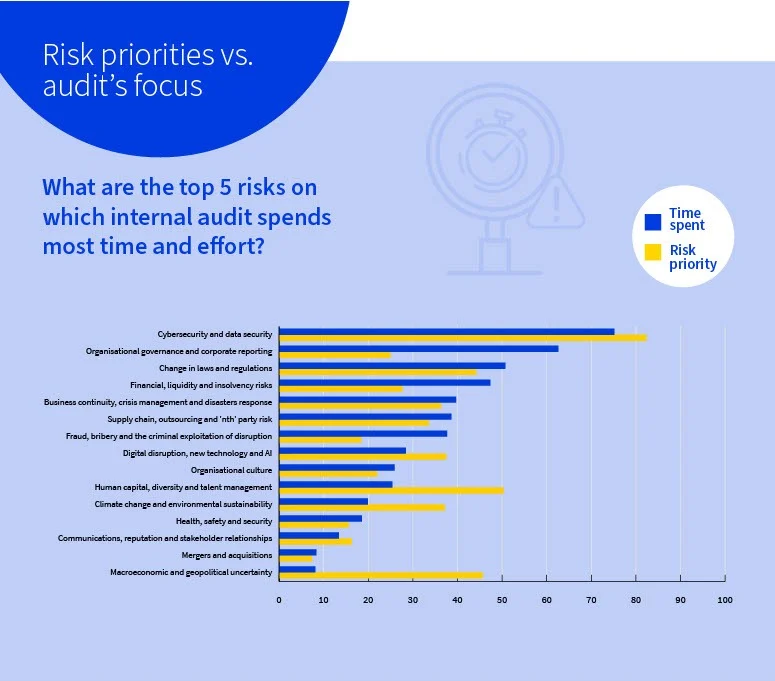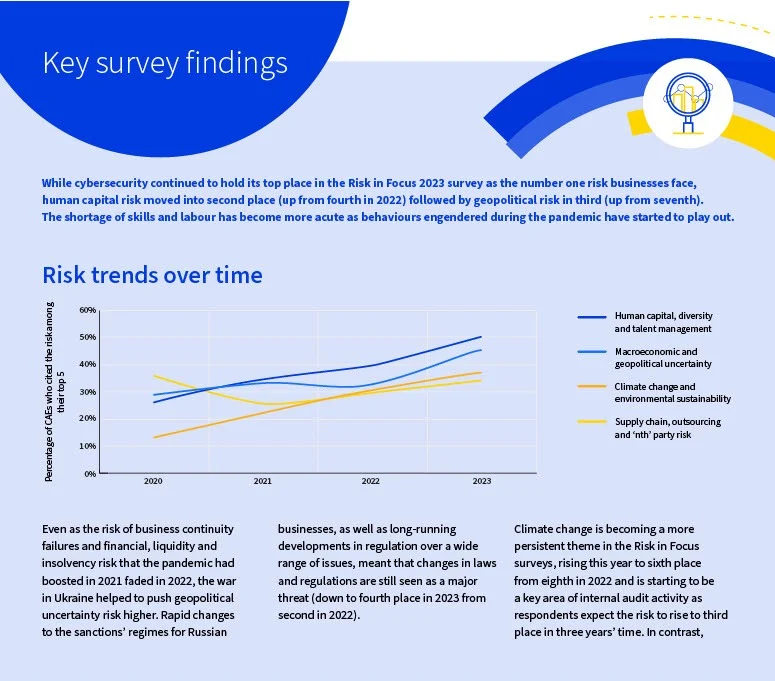Why and How Talent, Human Capital and Culture Should Be Considered in Your Internal Audit Plan
Race for digital skills, diversity and inclusion, remote work, and employee well-being are trends that currently reflect the evolving landscape of talent, human capital, and culture. By addressing these trends and cultural transformation, organisations can position themselves for success in a rapidly changing industry.
“Human capital, diversity and talent management” is one of the fastest increasing risk categories and was actually considered the second largest risk of organisations in the large European survey “Risk in Focus 2023” – only beaten by “cybersecurity and data security”. At the same time, the survey could establish that there is a huge gap between risk priority and time spent by Internal audit function on risks related to human capital, diversity and talent management. These topics are often overlooked due to a focus on financial controls and compliance-driven audits.
That said – there is a great potential for your internal audit function to create more value for your organisation by including audits related to Talent, Human Capital and Culture in your audit plans. The purpose of this article is to provide input and inspiration for audits or assessments in this important risk category.


Source: Risk in focus 2023 – Hot topics for internal auditors
European Confederation of Institutes of Internal Auditing, ECIIA
There are multiple challenges to consider related to Talent, Human Capital and Culture: High demand for talents with expertise in data analysis, AI, and cybersecurity. Prioritized diversity and inclusion efforts to enhance decision-making and innovation. Remote work has become prevalent, requiring firms to adapt their talent management strategies. Employee well-being, mental health support, and work-life balance are other crucial considerations in today’s working landscape.
Here are some key questions your organisation needs to consider when talking about Talent, Human Capital and Culture:
How do we attract and develop professionals with the necessary digital skills? What steps do we take to upskill existing employees to meet these evolving demands?
All organisations are increasingly recognizing the importance of digital skills in a technology-driven landscape. The rise of fintech, data analytics, artificial intelligence, and cybersecurity has created a demand for talent with expertise in these areas. Thereby, they have to develop talent acquisitions strategies, adapt their training and upskilling programs, increase partnerships with tech firms, facilitate internal mobility, especially to develop digital skills and foster a culture of continuous learning to keep pace with digital advancements.
What initiatives do we implement to promote diversity and inclusion? How do we measure the impact of these efforts and ensuring an inclusive culture?
Organisations should be focusing on gender, racial, and ethnic diversity, as well as diversity of thought and background. Diverse teams are seen as drivers of innovation and better decision-making and institutions must take steps to measure the impact of their efforts and foster an inclusive culture.
How do we manage the challenges and opportunities of remote and hybrid work models? What strategies do we employ to maintain collaboration, productivity, and engagement in a distributed work environment?
The COVID-19 pandemic certainly accelerated the adoption of remote work in all industries. Firms have embraced hybrid work models, offering flexibility in where and how employees work. This has expanded the talent pool, enabling firms to access talent beyond traditional geographic boundaries.
Organisations have to develop policies including expectations for communication, collaboration tools, and work schedule flexibility. They need to provide secure remote access, virtual collaboration platforms, and digital tools that enable seamless communication, project management, and data sharing. They should consider performance management processes that measure and evaluate employee productivity, outcomes, and progress in remote and hybrid work setups and offer resources, such as mental health support programs, wellness initiatives, and access to online learning and development opportunities, to support employees’ overall well-being and professional growth. Many are recognizing the importance of employee well-being and mental health support. The high-pressure nature, coupled with increased remote work, have brought these issues to the forefront.
How do we redefine leadership models and nurture a culture that supports innovation and agility? How do we empower employees to take ownership and contribute to a more collaborative and inclusive culture?
Organisations are reassessing traditional leadership models and evolving their organisational culture. Agile, inclusive, and collaborative cultures are being fostered to adapt to changing market dynamics and attract millennial and Gen Z talent. Organisations are redefining leadership models by fostering a culture that supports innovation and agility through various approaches. They encourage leaders to embrace a more inclusive and collaborative leadership style that empowers employees to contribute ideas and drive innovation. They prioritize continuous learning and professional development for leaders to enhance their skills in managing change and fostering a culture of adaptability. By promoting a growth mindset and providing resources for experimentation and risk-taking, organisations nurture a culture that encourages innovation and agility at all levels.
Conclusion
An important advice to the Internal Audit function would be to incorporate a holistic approach that includes assessing human capital and culture alongside financial and non-financial controls to provide a comprehensive evaluation of organisational performance and risk management.
As inspiration, we conclude with a few relevant areas to consider in your audits, reviews or assessments in relation to Talent, Human Capital and Culture:
- Talent management strategies: The alignment with organisational goals and objectives.
- Recruitment and selection processes: Effectiveness, i.e. if the right people are hired.
- Training and development programs: Assess impact on enhancing employee skills and capabilities.
- Performance management systems: Do they promote employee development and accountability?
- Compensation and benefits structure: Assess for fairness and competitiveness.
- Communication channels and feedback mechanisms: Assessment of efficiency.
- Ethical culture: Assess the presence of a strong ethical culture and the implementation of ethics training and policies.
- Employee engagement: assessment of employee morale, satisfaction, motivation and commitment, and measures taken on the results from engagement surveys.
- Diversity and inclusion practices: Do they ensure a diverse and inclusive workforce?
- Succession planning and talent retention strategies: Are they in place and effective?
- Labor laws and regulations: Awareness and compliance.
For more information, please contact:


